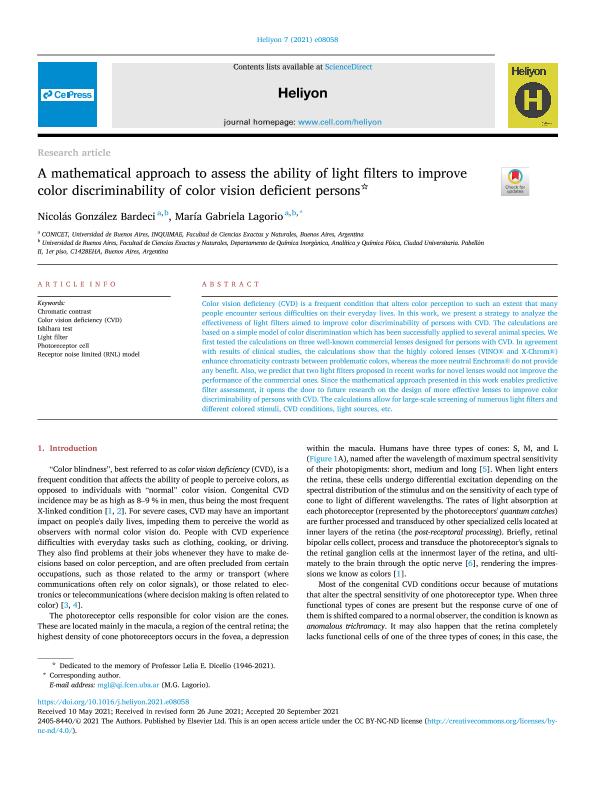Mostrar el registro sencillo del ítem
dc.contributor.author
González Bardeci, Nicolás Diego

dc.contributor.author
Lagorio, María Gabriela

dc.date.available
2022-12-19T13:41:09Z
dc.date.issued
2021-09
dc.identifier.citation
González Bardeci, Nicolás Diego; Lagorio, María Gabriela; A mathematical approach to assess the ability of light filters to improve color discriminability of color vision deficient persons☆; Elsevier; Heliyon; 7; 9; 9-2021; 1-9
dc.identifier.uri
http://hdl.handle.net/11336/181722
dc.description.abstract
Color vision deficiency (CVD) is a frequent condition that alters color perception to such an extent that many people encounter serious difficulties on their everyday lives. In this work, we present a strategy to analyze the effectiveness of light filters aimed to improve color discriminability of persons with CVD. The calculations are based on a simple model of color discrimination which has been successfully applied to several animal species. We first tested the calculations on three well-known commercial lenses designed for persons with CVD. In agreement with results of clinical studies, the calculations show that the highly colored lenses (VINO® and X-Chrom®) enhance chromaticity contrasts between problematic colors, whereas the more neutral Enchroma® do not provide any benefit. Also, we predict that two light filters proposed in recent works for novel lenses would not improve the performance of the commercial ones. Since the mathematical approach presented in this work enables predictive filter assessment, it opens the door to future research on the design of more effective lenses to improve color discriminability of persons with CVD. The calculations allow for large-scale screening of numerous light filters and different colored stimuli, CVD conditions, light sources, etc.
dc.format
application/pdf
dc.language.iso
eng
dc.publisher
Elsevier

dc.rights
info:eu-repo/semantics/openAccess
dc.rights.uri
https://creativecommons.org/licenses/by-nc-nd/2.5/ar/
dc.subject
CHROMATIC CONTRAST
dc.subject
COLOR VISION DEFICIENCY (CVD)
dc.subject
ISHIHARA TEST
dc.subject
LIGHT FILTER
dc.subject
PHOTORECEPTOR CELL
dc.subject
RECEPTOR NOISE LIMITED (RNL) MODEL
dc.subject.classification
Óptica

dc.subject.classification
Ciencias Físicas

dc.subject.classification
CIENCIAS NATURALES Y EXACTAS

dc.title
A mathematical approach to assess the ability of light filters to improve color discriminability of color vision deficient persons☆
dc.type
info:eu-repo/semantics/article
dc.type
info:ar-repo/semantics/artículo
dc.type
info:eu-repo/semantics/publishedVersion
dc.date.updated
2022-10-03T18:49:28Z
dc.identifier.eissn
2405-8440
dc.journal.volume
7
dc.journal.number
9
dc.journal.pagination
1-9
dc.journal.pais
Países Bajos

dc.journal.ciudad
Ámsterdam
dc.description.fil
Fil: González Bardeci, Nicolás Diego. Consejo Nacional de Investigaciones Científicas y Técnicas. Oficina de Coordinación Administrativa Ciudad Universitaria. Instituto de Química, Física de los Materiales, Medioambiente y Energía. Universidad de Buenos Aires. Facultad de Ciencias Exactas y Naturales. Instituto de Química, Física de los Materiales, Medioambiente y Energía; Argentina. Universidad de Buenos Aires. Facultad de Cs.exactas y Naturales. Departamento de Química Inorganica, Anal.y Qca.física. Area de Fotoquímica; Argentina
dc.description.fil
Fil: Lagorio, María Gabriela. Consejo Nacional de Investigaciones Científicas y Técnicas. Oficina de Coordinación Administrativa Ciudad Universitaria. Instituto de Química, Física de los Materiales, Medioambiente y Energía. Universidad de Buenos Aires. Facultad de Ciencias Exactas y Naturales. Instituto de Química, Física de los Materiales, Medioambiente y Energía; Argentina. Universidad de Buenos Aires. Facultad de Cs.exactas y Naturales. Departamento de Química Inorganica, Anal.y Qca.física. Area de Fotoquímica; Argentina
dc.journal.title
Heliyon
dc.relation.alternativeid
info:eu-repo/semantics/altIdentifier/doi/https://doi.org/10.1016/j.heliyon.2021.e08058
dc.relation.alternativeid
info:eu-repo/semantics/altIdentifier/url/https://www.sciencedirect.com/science/article/pii/S2405844021021617
Archivos asociados
